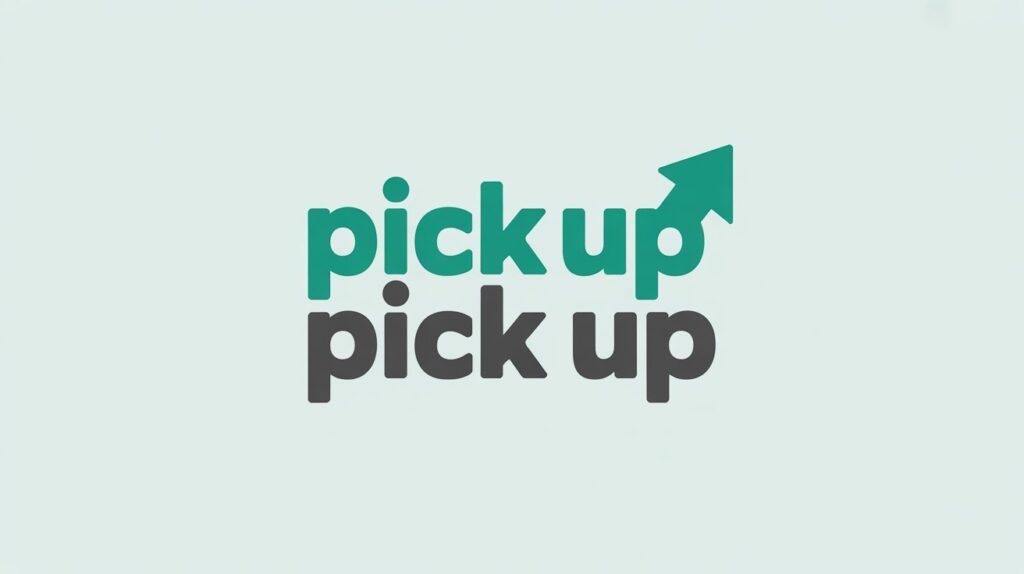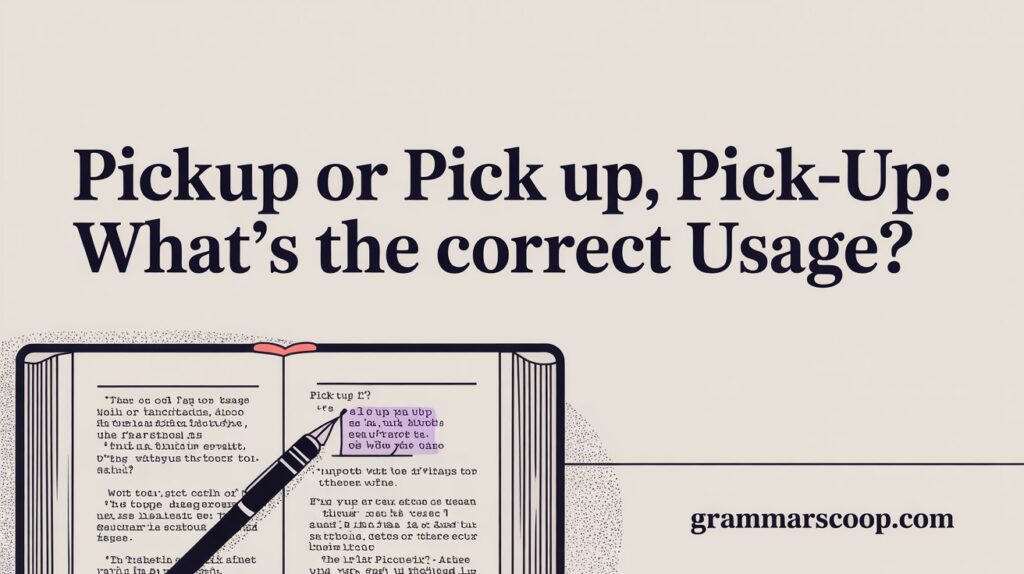Ever stared at a sentence and wondered, “Pickup or Pick up, Pick-Up?” You’re not alone. These forms trip up even seasoned writers. Though they sound identical, they serve different grammatical purposes, and using the wrong one can confuse your reader or dilute your message.
Let’s break this down in plain English and arm you with everything you need to confidently choose the correct usage—whether you’re writing an email, blog post, instruction manual, or even naming a truck.
Why So Much Confusion Over Pick-Up, PickUp or Pick up?
The English language is full of compound constructions that evolve over time. What starts as two words (like pick up) often morphs into a hyphenated form (pick-up) and eventually becomes one solid word (pickup). This process is common with phrasal verbs that grow into nouns.
The confusion arises because:
- They sound exactly the same
- They’re used in different parts of speech (verb vs noun vs adjective)
- Some style guides differ on preferred usage
- Technology tools (like autocorrect) suggest inconsistent corrections
To clear it all up, we’ll analyze each version by its function.
Breaking It Down by Form and Function
“Pick Up” – The Verb Phrase
Pick up is a phrasal verb, which means it’s a verb (pick) followed by a preposition (up). This form is used when you’re describing an action.
Examples:
- I’ll pick up dinner on the way home.
- Can you pick up the kids at 3?
- He needs to pick up the pace.
Common meanings:
- To collect or retrieve
- To acquire something
- To improve or increase
- To learn casually (pick up a language)
Tip: If someone is doing something, you’re likely dealing with a verb, and the correct form is pick up.
“Pickup” – The Noun and Adjective
When the phrase becomes a thing, it transforms into pickup—a single compound word that functions as a noun or adjective.
Examples:
- We scheduled a pickup for the package.
- He drives a red pickup truck.
- Sales saw a pickup in the second quarter.
Meanings as a noun:
- An event where something is collected or retrieved
- A vehicle (typically a pickup truck)
- A small improvement or boost
- A device in electronics (e.g., guitar pickup)
Meanings as an adjective:
- Describing something related to collecting or retrieval (e.g., pickup location, pickup order)
“Pick-Up” – The Hyphenated Form

While once commonly used, pick-up has mostly faded in formal writing. It’s now seen as a stylistic choice, mostly in:
- Branding or headlines
- UK English publications
- Creative writing or ad copy
Today, most dictionaries and style guides prefer pickup or pick up, depending on the part of speech.
Use pick-up only when dictated by style, clarity, or tradition. Otherwise, it’s better to avoid it.
When to Use Each: The Quick Guide
Here’s a handy breakdown for choosing the correct usage:
| Usage Type | Correct Form | Example Sentence |
|---|---|---|
| Verb (action) | pick up | I’ll pick up groceries. |
| Noun (thing) | pickup | The pickup is scheduled for 2 PM. |
| Adjective | pickup | We use a pickup service. |
| Obsolete or stylized form | pick-up | (Brand name or stylized headline) |
Real-World Usage Examples
Let’s see how these forms appear in different real-life contexts:
Business
- “There’s been a pickup in orders.”
- “There’s been a pick up in orders.”
Logistics
- “Your pickup has been scheduled.”
- “Please pick up your package before 5 PM.”
Automotive
- “She drives a Ford pickup.” True
- “She drives a Ford pick up truck.” Wrong
Music
- “The guitar pickup stopped working.” True
- “The guitar pick up stopped working.” Wrong
Technology
- “The mic has a strong pickup range.” True
- “The signal will pick up soon.” True
Synonyms and Similar Terms

Having trouble deciding? Sometimes the best option is to use an alternative. Here’s a list of synonyms you can consider.
Synonyms for “Pickup” (noun)
| Context | Synonyms |
|---|---|
| Logistics | Collection, retrieval, gathering |
| Vehicles | Truck, hauler, utility vehicle |
| Business | Boost, increase, spike |
| Music/Tech | Sensor, receiver, transducer |
Synonyms for “Pick Up” (verb)
| Context | Synonyms |
|---|---|
| Collecting | Retrieve, fetch, grab |
| Learning | Absorb, acquire, pick out |
| Improving | Increase, enhance, escalate |
Here’s the full section under H2: Etymology and Evolution—written in markdown format, enriched with contextual depth, historical insight, SEO optimization, and a natural, conversational flow.
READ MORE:
- Cancelation or Cancellation: Which Spelling is Correct?
- Requestor or Requester: Which Spelling to Use?
- Tieing or Tying? The Right Way to Spell It
Etymology and Evolution
Language doesn’t stand still. Words evolve, merge, and take on new meanings. The journey from pick up to pickup tells a fascinating story about how English adapts to usage patterns, social change, and convenience.
Origins of “Pick Up”

Let’s rewind to the roots.
Root Words and the Rise of the Phrasal Verb
The verb phrase pick up comes from two distinct Middle English components:
- Pick: Derived from Middle English piken, which meant “to peck or pluck.” This, in turn, has roots in Old French piquer (to prick or pierce).
- Up: A preposition with Old English origins (up or upp) that implies movement or direction.
By the 1300s, pick was used in contexts like “picking flowers” or “picking a fight.” The phrasal verb pick up didn’t show up until later, but the foundation was there.
First Printed Appearance
According to the Oxford English Dictionary (OED), the earliest known use of pick up in a form resembling its modern sense was in the late 1600s. It referred to gathering or collecting something—exactly how we still use it today:
“The boy went to pick up stones from the yard.” — Circa 1690
The phrase evolved over centuries to include dozens of meanings:
- To lift something physically
- To learn something informally (“pick up a language”)
- To collect someone or something (“pick up groceries”)
- To resume a conversation (“pick up where we left off”)
Its flexibility is one reason it’s remained so dominant in English usage.
Transition to “Pickup”
Now, here’s where things get interesting.
Compound Nouns in English
The noun form, spelled pickup, is a compound noun—a word formed when two words fuse into one. This transformation typically follows a path like this:
- Open compound: “pick up”
- Hyphenated compound: “pick-up”
- Closed compound: “pickup”
This is a common pattern in English. For example:
| Verb Phrase | Hyphenated | Compound Noun |
|---|---|---|
| check out | check-out | checkout |
| set up | set-up | setup |
| log in | log-in | login |
The noun “pickup” started appearing in print around the early 20th century, especially with the rise of pickup trucks and scheduled pickups for services like mail, garbage, or goods.
First Recorded Usage (per Merriam-Webster): “pickup truck” was first seen in 1913, aligned with the rise of the auto industry.
Why Language Economies Favor Compounds
Here’s the logic: the more we use a phrase, the more we try to streamline it. Typing “pickup” is faster than “pick up.” And when the usage shifts from action (verb) to thing (noun), compressing it into one word improves readability and efficiency.
This process is known as lexicalization—when a phrase becomes so familiar it turns into a single unit.
“English favors efficiency, especially in modern media and tech-driven communication. That’s why compound nouns like pickup dominate headlines, apps, and branding.” — Linguist Deborah Tannen
Summary Table: Evolution at a Glance
| Form | Function | Era | Example |
|---|---|---|---|
| Pick up | Verb phrase | 1600s–Present | “I’ll pick up the phone.” |
| Pick-up | Transitional noun (hyphenated) | 1800s–1900s | “Scheduled pick-up available.” |
| Pickup | Noun or adjective | 1900s–Present | “The pickup location is down the street.” |
Real-Life Implications of This Evolution
- Branding: Companies prefer shorter forms like pickup for packaging, logos, and signage.
- Tech UI: Apps like Uber, DoorDash, and Amazon use pickup because it fits better in limited space.
- Grammar instruction: Schools often skip teaching this evolution, leaving learners confused.
By understanding the history of pick up, pick-up, and pickup, you’re not just memorizing rules—you’re tapping into how language naturally adapts.
So next time you see a sign for “Curbside Pickup,” you’ll know it’s not just a convenience—it’s a linguistic evolution.
Common Mistakes and How to Avoid Them
Let’s call out frequent errors to dodge in your writing.
Mistake 1: Using “pickup” as a verb
Wrong “I’ll pickup dinner.”
Correct: “I’ll pick up dinner.”
Mistake 2: Hyphenating unnecessarily
Wrong “She scheduled a pick-up.”
Correct: “She scheduled a pickup.”
Mistake 3: Using “pick up” as a noun
Wrong: “The pick up was delayed.”
Correct: “The pickup was delayed.”
Pro tip: If you’re unsure, swap the phrase with another noun or verb. If the sentence still makes sense, you’ve chosen the right one.
A Writer’s Cheat Sheet
Need a quick refresher? Bookmark this.
- Use “pick up”: Anytime it’s an action
- Use “pickup”: When referring to a thing or an adjective
- Avoid “pick-up” unless you’re styling, quoting, or branding something specific
Case Study: Pickup vs Pick Up in the Wild
Let’s look at how major brands and organizations handle this.
Amazon
- Uses pickup in headers like: “Amazon Hub Locker Pickup”
- Uses pick up in descriptions: “You can pick up your order…”
UPS
- Schedules a pickup (noun)
- Lets you pick up (verb) your missed delivery
AP Stylebook
- Recommends “pickup” as noun/adjective
- “Pick up” as verb
Oxford Dictionary
- Lists pickup as noun
- Pick up listed under phrasal verbs
These industry standards align with what we’ve outlined here.
Conclusion: Mastering the Correct Usage of Pickup, Pick Up, and Pick-Up
The distinction isn’t just grammatical—it affects tone, clarity, and even professionalism. Whether you’re writing a resume, article, or product description, using the correct usage of pick up, pickup, or pick-up matters.
To recap:
- “Pick up” = verb phrase (action)
- “Pickup” = noun/adjective (thing or descriptor)
- “Pick-up” = mostly outdated, used for style or branding
Get this right, and you’ll sharpen your writing, avoid misunderstandings, and impress editors, readers, and algorithms alike.

Lisa Morris is a seasoned blogger and language enthusiast with a passion for making grammar simple and engaging. At Grammar Scoop, she shares clear, concise tips that help readers master the rules of English with confidence.






